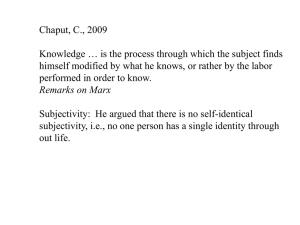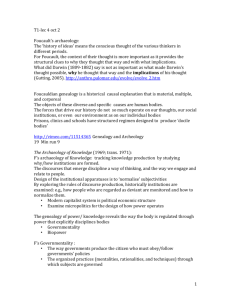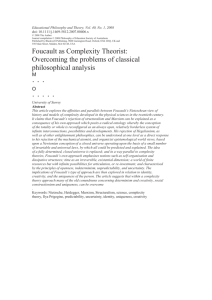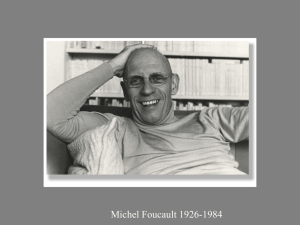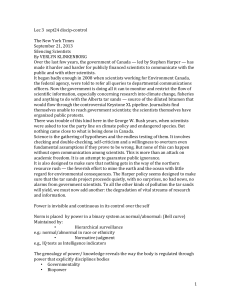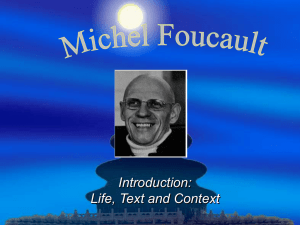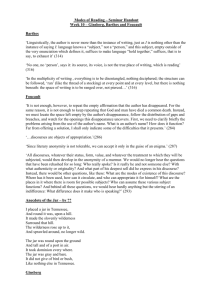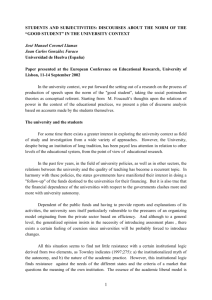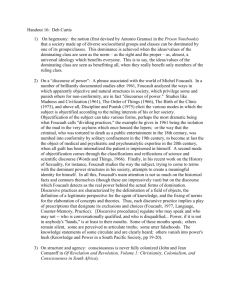Chaput, C
advertisement
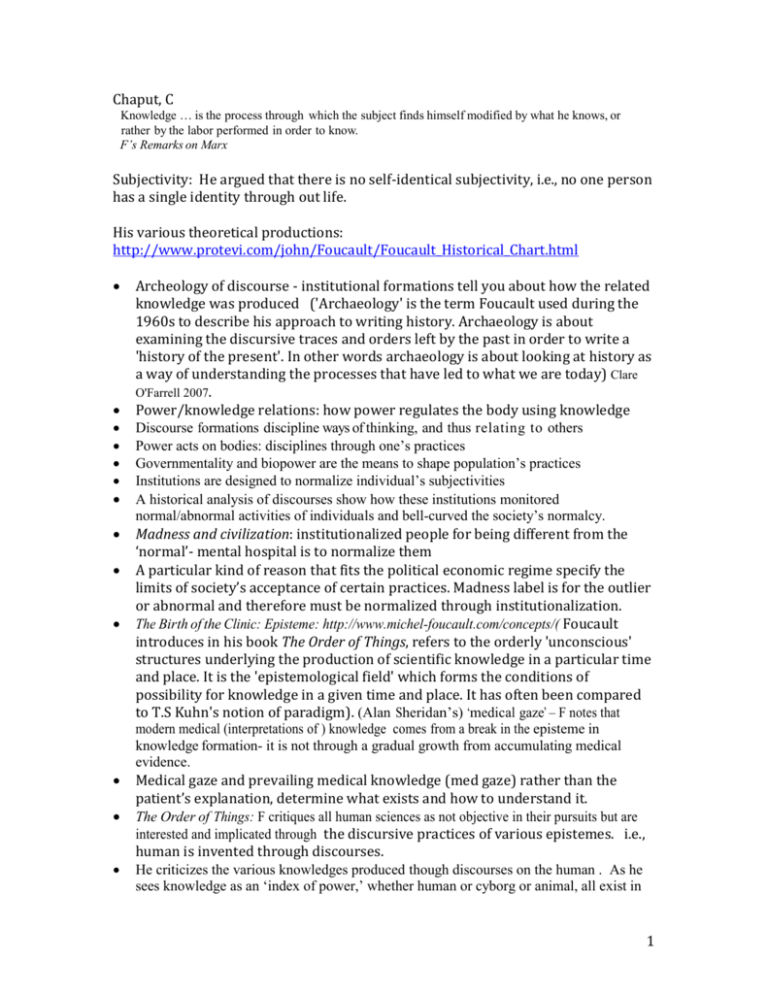
Chaput, C
Knowledge … is the process through which the subject finds himself modified by what he knows, or
rather by the labor performed in order to know.
F’s Remarks on Marx
Subjectivity: He argued that there is no self-identical subjectivity, i.e., no one person
has a single identity through out life.
His various theoretical productions:
http://www.protevi.com/john/Foucault/Foucault_Historical_Chart.html
Archeology of discourse - institutional formations tell you about how the related
knowledge was produced ('Archaeology' is the term Foucault used during the
1960s to describe his approach to writing history. Archaeology is about
examining the discursive traces and orders left by the past in order to write a
'history of the present'. In other words archaeology is about looking at history as
a way of understanding the processes that have led to what we are today) Clare
O'Farrell 2007.
Power/knowledge relations: how power regulates the body using knowledge
Discourse formations discipline ways of thinking, and thus relating to others
Power acts on bodies: disciplines through one’s practices
Governmentality and biopower are the means to shape population’s practices
Institutions are designed to normalize individual’s subjectivities
A historical analysis of discourses show how these institutions monitored
normal/abnormal activities of individuals and bell-curved the society’s normalcy.
Madness and civilization: institutionalized people for being different from the
‘normal’- mental hospital is to normalize them
A particular kind of reason that fits the political economic regime specify the
limits of society’s acceptance of certain practices. Madness label is for the outlier
or abnormal and therefore must be normalized through institutionalization.
The Birth of the Clinic: Episteme: http://www.michel-foucault.com/concepts/( Foucault
introduces in his book The Order of Things, refers to the orderly 'unconscious'
structures underlying the production of scientific knowledge in a particular time
and place. It is the 'epistemological field' which forms the conditions of
possibility for knowledge in a given time and place. It has often been compared
to T.S Kuhn's notion of paradigm). (Alan Sheridan’s) ‘medical gaze’ – F notes that
modern medical (interpretations of ) knowledge comes from a break in the episteme in
knowledge formation- it is not through a gradual growth from accumulating medical
evidence.
Medical gaze and prevailing medical knowledge (med gaze) rather than the
patient’s explanation, determine what exists and how to understand it.
The Order of Things: F critiques all human sciences as not objective in their pursuits but are
interested and implicated through the discursive practices of various epistemes. i.e.,
human is invented through discourses.
He criticizes the various knowledges produced though discourses on the human . As he
sees knowledge as an ‘index of power,’ whether human or cyborg or animal, all exist in
1
its own regime of discourses. i.e., all have rules for existing and being within the
boundaries of that society.
o
Chaput: p Foucault later clarifies that men ‘constitute themselves in an infinite and multiple series of
different subjectivities that would never reach an end’ (Remarks on Marx 123). A particular version of
the human – the being coextensive with capitalism’s rationality – is a recent invention and not
necessarily the form the human must take.
F’s object of study shifts from discourse (that forms institutional and disciplinary
knowledge) to power (that forms the body that is subjected to differing epistemes)
“The body is an element to be managed in relation to strategies of the economic and social
management of populations. …. Episteme: the orderly 'unconscious' structures underlying the
production of scientific knowledge in a particular time and place. It is the 'epistemological field' which
forms the conditions of possibility for knowledge in a given time and place (Clair O’Farrell)
F connects different events from analyzing the different interpretations that emerge on the
event – these are perspectives not ‘transcendental truth’. Certain powers are connected to
certain practices that shape the body.
Discipline and Punish (1975; trans. 1977): study of Prison- docile bodies and constant
surveillance - He also uses the term 'disciplinary society', discussing its history and the origins and
disciplinary institutions such as prisons, hospitals, asylums, schools and army barracks. Foucault also
specifies that when he speaks of a 'disciplinary society' he does not mean a 'disciplined society'
O’Ferrell).
The History of Sexuality: An Introduction (1976; trans. 1978) and retitled as The Will to
Knowledge. The Uses of Pleasure (1984; trans. 1985) and The Care of the Self (1984;
trans. 1986). Sexuality and repression – power- represses but also produces- power also
generates resistance
Biopower and biopolitics: discussed in F’s Lectures on ‘governmentality’ (Collège de
France ).
Society Must Be Defended (lectures from 1975 to 1976). individual practices and
institutional processes maintain capitalism – defends the society, i.e., using biopower
(“birth and death rates, literacy rates, insurance rates, inter- est rates, and forecasts that enumerate future
projects and quantify normalcy within statistical averages. This form of ‘power has no control over death but it can
control mortality’ (Society 248).”Chaput, p.100 ). Political logic is used is policies to regulate population,
poverty, etc., so that govts let some die and forces others live , e.g., cuts to food stamps.
F challenges:
o How does the society maintain freedom vis-à-vis its power that produces
unfreedom
o How does society resolve the paradox of a secure society that is the
paradoxes generated by a security society the basis of which is premised on
insecurity of life and freedom.
Foucault’s ‘Nietzsche, Genealogy, History’ offers three theories for establishing countermemory: parody, disassociation, and sacrifice
Parodic repetition of the traditional court that would expose the policing
problems. Parody is thus a political practice and not an academic matter with a
theoretical solution. Parody opens up one’s assessment of the police for public
discussion instead of repeating the courtroom procedures that would reinforce the
previous practice of injustice . This will reject the logics of the courtroom as an
institution that reinforced the unjust practice.
2
F argued that we don’t need to change people’s consciousness (what one thinks) to
arrive at the truth. But, we must change the political, economic, institutional regime
of the production of ‘truth’.
3
